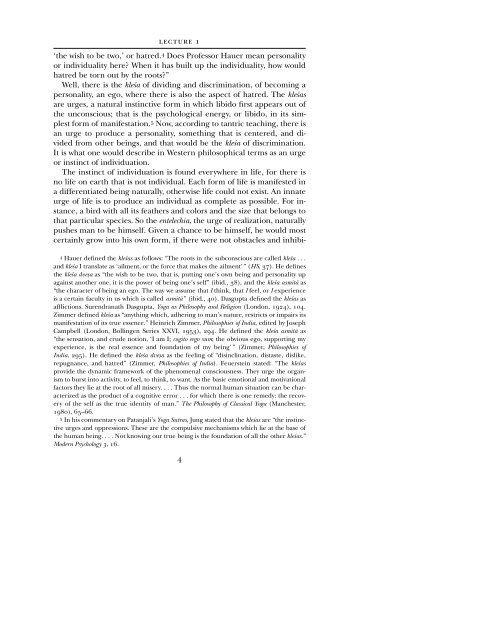CG JUNG - Countryside Anarchist
CG JUNG - Countryside Anarchist
CG JUNG - Countryside Anarchist
You also want an ePaper? Increase the reach of your titles
YUMPU automatically turns print PDFs into web optimized ePapers that Google loves.
LECTURE 1<br />
‘the wish to be two,’ or hatred. 4 Does Professor Hauer mean personality<br />
or individuality here? When it has built up the individuality, how would<br />
hatred be torn out by the roots?”<br />
Well, there is the kleça of dividing and discrimination, of becoming a<br />
personality, an ego, where there is also the aspect of hatred. The kleças<br />
are urges, a natural instinctive form in which libido first appears out of<br />
the unconscious; that is the psychological energy, or libido, in its simplest<br />
form of manifestation. 5 Now, according to tantric teaching, there is<br />
an urge to produce a personality, something that is centered, and divided<br />
from other beings, and that would be the kleça of discrimination.<br />
It is what one would describe in Western philosophical terms as an urge<br />
or instinct of individuation.<br />
The instinct of individuation is found everywhere in life, for there is<br />
no life on earth that is not individual. Each form of life is manifested in<br />
a differentiated being naturally, otherwise life could not exist. An innate<br />
urge of life is to produce an individual as complete as possible. For instance,<br />
a bird with all its feathers and colors and the size that belongs to<br />
that particular species. So the entelechia, the urge of realization, naturally<br />
pushes man to be himself. Given a chance to be himself, he would most<br />
certainly grow into his own form, if there were not obstacles and inhibi-<br />
4 Hauer defined the kleças as follows: “The roots in the subconscious are called kleça ...<br />
and kleça I translate as ‘ailment, or the force that makes the ailment’” (HS, 37). He defines<br />
the kleça dveüa as “the wish to be two, that is, putting one’s own being and personality up<br />
against another one, it is the power of being one’s self” (ibid., 38), and the kleça asmitv as<br />
“the character of being an ego. The way we assume that I think, that I feel, or I experience<br />
is a certain faculty in us which is called asmitv ” (ibid., 40). Dasgupta defined the kleças as<br />
afflictions. Surendranath Dasgupta, Yoga as Philosophy and Religion (London, 1924), 104.<br />
Zimmer defined kleça as “anything which, adhering to man’s nature, restricts or impairs its<br />
manifestation of its true essence.” Heinrich Zimmer, Philosophies of India, edited by Joseph<br />
Campbell (London, Bollingen Series XXVI, 1953), 294. He defined the kleça asmitv as<br />
“the sensation, and crude notion, ‘I am I; cogito ergo sum; the obvious ego, supporting my<br />
experience, is the real essence and foundation of my being’ ” (Zimmer, Philosophies of<br />
India, 295). He defined the kleça dveüa as the feeling of “disinclination, distaste, dislike,<br />
repugnance, and hatred” (Zimmer, Philosophies of India). Feuerstein stated: “The kleças<br />
provide the dynamic framework of the phenomenal consciousness. They urge the organism<br />
to burst into activity, to feel, to think, to want. As the basic emotional and motivational<br />
factors they lie at the root of all misery. . . . Thus the normal human situation can be characterized<br />
as the product of a cognitive error . . . for which there is one remedy: the recovery<br />
of the self as the true identity of man.” The Philosophy of Classical Yoga (Manchester,<br />
1980), 65–66.<br />
5 In his commentary on Patanjali’s Yoga Sutras, Jung stated that the kleças are “the instinctive<br />
urges and oppressions. These are the compulsive mechanisms which lie at the base of<br />
the human being. . . . Not knowing our true being is the foundation of all the other kleças.”<br />
Modern Psychology 3, 16.<br />
4


